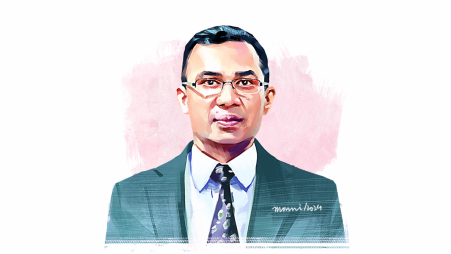For the past 15–16 years since 1/11, you all endured unspeakable torture and abuse. You were subjected to false cases, and you were oppressed by the police or by runaway autocrats and their cohorts… We do not want to take that revenge through oppression. We do not want to do what they did, he says
Tarique Rahman. Sketch: TBS
“>

Tarique Rahman. Sketch: TBS
BNP acting chairperson Tarique Rahman today (23 April) said his party does not want to take revenge on their oppressors through retaliation, but wants to implement its 31-point reform proposal, aimed at serving the interests of people.
“For the past 15–16 years since 1/11, you all endured unspeakable torture and abuse. You were subjected to false cases, and you were oppressed by the police or by runaway autocrats and their cohorts… We do not want to take that revenge through oppression. We do not want to do what they did,” he said while virtually addressing four workshops.
The BNP leader said the implementation of the party’s 31-point reform proposal would serve as the means of reprisal against those who oppressed BNP leaders and activists.
“We want to take revenge for the torture and oppression that you endured in the past through the implementation of the 31-point,” he said.
By implementing the 31-point in the interest of the country and its people, Tarique said, “I want to take revenge for the torture and oppression that was inflicted on me, the imprisonment that I served, the oppression and imprisonment that was inflicted on my mother, and the way my brother was killed, through the implementation of the 31 points.”
The BNP Training Affairs Committee arranged the workshops titled ’31-Point State Structure Reform Proposal and Public Engagement’ in Rangpur City, Rangpur and Nilphamari districts, and Saidpur upazila.
Tarique called upon his party colleagues to take the party’s 31-point proposals to the doorsteps of people across the country, regardless of their political affiliation or opinion, and to mobilise public support in favour of the reform agenda.
“Throughout the day, we discussed issues relating to the interests of the country and its people in the workshops. We must implement the 31-point if we want to execute the plans and protect the interests of the people,” he said.
The BNP leader said the people and their support are the main political capital for any political party. “When we see our processions growing and an overwhelming turnout at our rallies, it brings us joy… As political activists, we always strive for public support and higher votes for our candidates.”
Stating that evil campaigns are being carried out on social media and in the mainstream media to tarnish BNP’s image, Tarique said he warned the party’s rank and file about it seven to eight months ago.
“Our unseen opponents are becoming visible, and others are joining them. So, the more effectively we communicate our agenda and goals for the country to the people and gain their support, the stronger we will be in confronting both visible and invisible opponents. We all share the responsibility to make this happen,” he said.
Tarique highlighted the contributions of BNP founder Ziaur Rahman and Chairperson Khaleda Zia during their tenures, noting their focus on developing the education, health, communication, transportation, and agriculture sectors, as well as creating employment opportunities and boosting agricultural production.
He said the core objective of BNP’s politics is to ensure the welfare of the country and its people.
Tarique urged party leaders and workers to remain united and work collectively to strengthen the BNP and counter any conspiracies, following the ideals of Ziaur Rahman and Khaleda Zia.
He said the people of the country believe BNP can deliver positive outcomes, as they continue to place their trust in the party. “We all have the responsibility to uphold that trust, and unity is essential to do so,” he said.
Before addressing the workshops, Tarique responded to various questions from participants.
He also outlined BNP’s plans to tackle challenges in agriculture, health, education, communication, and the financial sector, aiming to promote economic development and ensure public welfare.


